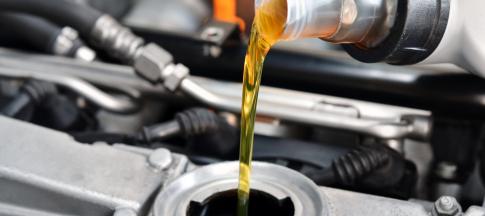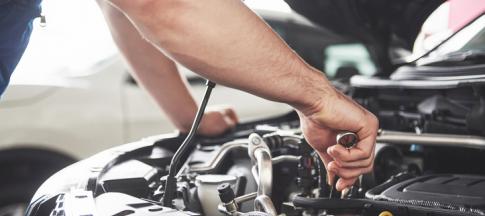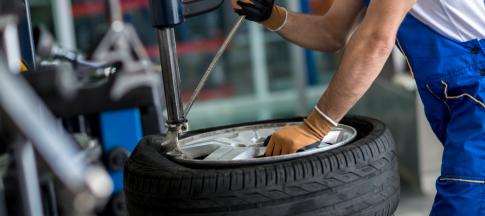
In a nutshell, if you look after your car properly and you don't drive aggressively, it’ll last longer.
Our ten tips below may seem obvious, but you'd be surprised by how many breakdowns and potentially dangerous defects are caused by not doing them.
It's also worth remembering that a well maintained car is:
- less likely to break down because of a common fault
- more efficient, so you'll save on fuel
- often cheaper to fix because problems are caught earlier
- more environmentally-friendly because it runs cleaner and is more economical
- likely to have a higher resale value and a longer life
So let’s take a look at 10 things you can do to help your car last longer.
1) Service your car regularly
Modern cars are pretty reliable, but there's still no substitute for maintaining your car properly.
Make sure you stick to the service schedule (usually a full service every year). Check your car's handbook or manual to find out how often it's due a service and what work is needed.
What's more, a service book full of stamps will add value to your car when you come to sell it.
Plus, a full service history will also make your car more attractive to prospective buyers.
2) Drive smoothly
Sensible driving is another essential for increasing a car's life expectancy.
Smooth inputs via the steering wheel, accelerator, gear lever, brakes and clutch will put less stress on your car, meaning less wear and tear and higher fuel economy.
That said, once in a while (and only when it’s safe) it’s good to push an engine to clear out carbon deposits, while regular longer runs will keep the battery fully charged.
3) Keep your car clean
Washing your car isn't just about pride of ownership - it can also help to protect it in the long term.
Salt and grit from the roads in the winter are especially dangerous, so it's best to regularly wash the bodywork, the wheel arches and the underside of your car during extreme weather.
A jet wash is ideal for cleaning off salt deposits, but generally, there's no substitute for a thorough hand wash, followed by a polish for added protection against the elements.
Also, clean off bird droppings and tree sap immediately because they can damage paintwork if left.
4) Check your tyres
At least once a month, try to spare the time to check all four tyres for damage and tread depth, and make sure they’re pumped up to the correct pressure.
Legally, the tread depth must be at least 1.6mm but, but for peace of mind, 2-3mm is recommended.
If you have defective, damaged or bald tyres you could be fined up to £10,000 (£2,500 per tyre) and receive 12 penalty points on your licence. But safety should be reason enough to keep your tyres in tip-top condition!
5) Top up fluids
Checking your car's engine coolant and oil level is one of the easiest and most essential regular car maintenance jobs. Not doing this will increase the risk of a breakdown and expensive engine damage.
Check your engine dipstick regularly and keep the oil topped up. Make sure your coolant level is also maintained.
Stick to the correct water/anti-freeze mix (the blend is usually 50/50, but it's best to check your car's manual).
Finally, also make sure you have enough screenwash – driving with a dirty windscreen can be extremely dangerous.
Check out our video on how to check and refill your engine coolant.
6) See it, sort it
If a warning light comes up on your dashboard or you hear an unusual noise, get it checked out as soon as possible.
It may be tempting to leave it in the hope it goes away, but catching a problem early will save you money in the long term, and may even avoid a breakdown or an accident.
7) Take cover
Most garages are packed with junk and never used for their number one job - which is to keep your car safe and protect it from the elements.
If you have no choice but to park on the drive or on a public road, consider investing in a car cover.
8) Deal with rust
There's a reason why so few older cars have survived, and that's rust. Modern cars are far more rust-resistant, but don't be complacent.
As mentioned above, regular cleaning is essential. If you get a stone chip, dent or scratch and bare metal is exposed, touch it up immediately or get it repaired before rust sets in.
Also, consider having your car undersealed.
9) Care for your battery
Flat batteries are one of the biggest causes of breakdowns.
Leaving your car for days or weeks will cause the battery to lose its charge, while winter weather puts extra strain on it because it has to work much harder than usual.
If you’re going to leave your car standing for a while, if possible get a trickle charger hooked up to keep the battery healthy.
Also, try to give your car a longer run now and again so the battery gets fully charged.
10) Use it or lose it
Automotive features like air conditioning, electric windows, sliding sunroofs and retractable hoods on convertibles can seize up over time if they’re not used regularly.
Air con systems are especially susceptible and should be tested, even in the winter.
The refrigerant – also known as coolant – can often diminish over time, so might need topping up periodically (this is called recharging) at a garage.
I'm an experienced journalist, digital editor and copywriter, now specialising in motoring. I’m editor of Automotive Blog and have worked across the media in newspapers, magazines, TV, teletext, radio and online for household names including the BBC, GMTV, ITV and MSN. I’ve produced digital content in the financial sector for Lloyds Bank, Nationwide and the Money Advice Service. I'm married with two children and live near Bath in Somerset.



